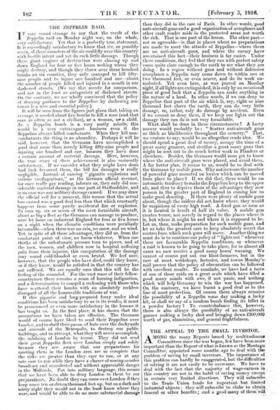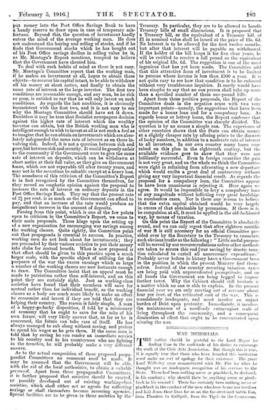THE APPEAL TO THE SMALL INVESTOR.
AMONG the many Reports issued by multitudinous Committees since the war began, few have been more important than the Report of what is known as the Montagu Committee, appointed some months ago to deal with the problem of saving by small investors. The importance of this problem can hardly be exaggerated, but the difficulties of solving it are not easily to be overcome. We have to deal with the fact that the majority of wage-earners in this country are not in the habit of saving money except in certain very limited directions. They will subscribe to the Trade Union funds for important but limited industrial objects they will subscribe to clubs to obtaio funeral or other benefits ; and a good many of theidwill put money into the Post Office Savings Bank to have a handy reserve to draw upon in case of temporary mis- fOrtune. Beyond this, the question of investment hardly enters the mind of the average working man. He does not understand the buying and selling of stocks, and if he finds that Government stocks which he has bought out of his Post Office savings decline in selling value he is, as Mr. Montagu's Report mentions, tempted to believe that the Government have cheated him.
To deal with such habits of mind as these is not easy. !qr. Montagu's Committee report that the working man, if he makes an investment at all, hopes to obtain three objects—to recover his capital intact, to be able to withdraw all his money at short notice, and finally to obtain the same rate of interest as the large investor. The first two conditions are reasonable enough, and any man, be he rich or poor, is entitled to say that he will only invest on such conditions. As regards the last condition, it is obviously inconsistent with the first two, and it is not easy to see why the Montagu Committee should have set it down. Doubtless it may be true that Socialist newspapers declaim against the higher rate of interest which the wealthy investor can obtain, but the British working man who is intelligent enough to wish to invest at all is not such a fool as to imagine that he can obtain on investments which are abso- lutely safeguarded the same rate of interest as on those in- volving risk. Indeed, it is not a question between rich and poor,but between risk and security. It would be grossly unfair to the community if the Government were to give the same rate of interest on deposits, which can be withdrawn at short notice at their full value, as they give on Government loans, which are not repayable till after twenty years, and may not in the meantime be saleable except at a heavy loss. The soundness of this criticism of the Committee's Report is in fact recognized by the Committee themselves, for they record an emphatic opinion against the proposal to increase the rate of interest on ordinary deposits in the Post Office Savings Bank. They say that the present rate of 21 per cent. is as much as the Government can afford to Fay, and that an increase of the rate would produce an insignificant increase in the amount of deposits. Passing from this point, which is one of the few points open to criticism in the Committee's Report, we come to their main proposals. These hinge upon the setting up of a new organization for encouraging war savings among the working classes. Quite rightly, the Committee point out that propaganda is essential to success. In practice, working men do not look about for investments ; they are persuaded by their various societies to put their money into clubs for mutual benefit. What is now proposed is that effect should be given to this practice upon a much laiger scale, with the specific object of utilizing for the purposes of the war the excess earnings which so large a number of the working classes are now fortunate enough to draw. The Committee insist that an appeal must be made to patriotism rather than self-interest, and on this pOint they are certainly right. Just as working-class societies have found that their members will save for mutual rather than for individual benefit, so the working classes as a body are much more likely to make an effort to economize and invest if they are told that they are helping their country. The reason is fairly simple. A man of a happy-go-lucky disposition, if told by a missionary of economy that he ought to save for the sake of his own future, will very likely answer that, as far as he is concerned, the future can take care of itself. He has always managed to rub along without saving, and prefers to spend his wages as he gets them. If the same man is told that by saving he. can render an immediate service to his country and to his countrymen who are fighting in the trenches, he _ will probably make a very different answer.
As to the actual composition of these proposed propa- gandist Committees no comment need be made. It may be assumed that the Government will be able, with the aid of the local authorities, to obtain a suitable personnel. Apart from these propagandist Committees, it is further proposed that societies should be created, or possibly developed out of existing working-class societies, which shall either act as agents for collecting sayings or shall. themselves become investing agencies. Special facilities are to be given to these societies by the Treasury. In particular, they are to be allowed to handle Treasury bills of small dimensions. It is proposed that a Treasury bill, or the equivalent of a Treasury bill, of L1 in nominal value shall bo issued at the price of 15s. 6d. No interest is to be allowed for the first twelve months, but after that interest will be payable on withdrawal. If the holder of the bill keeps it for five clear years, he will be entitled to receive a full pound as the equivalent of his original 15s. 6d. The suggestion is one of the most ingenious that has yet been made. The Committee add that this attractive form of investment is to be limited to persons whose income is less than £300 a year. It is not quite easy to see how that condition is to be enforced without very troublesome inquiries. It surely would have been simpler to say that no one person shall take up more than a specified number of these one-pound bills. Apart from these positive proposals, the Report of the Committee deals in the negative sense with two very important points—namely, the suggestions that have been made for a bonus loan and for a compulsory loan. As regards bonus or lottery loans, the Report confesses that the opinion of the Committee was sharply divided. The question is by no means a simple one. The experience of other countries shows that the State can obtain money at a slightly cheaper rate by offering prizes to the drawers of lucky numbers, in addition to a moderate rate of interest to all investors. In our own country many loans were raised on this plan in the eighteenth century, but the available evidence goes to show that they were not brilliantly successful. Even in foreign countries the gain is not very great, and on the whole we think the Committee were right in refraining from advocating a new departure which would excite a great deal of controversy without giving any very important financial result. As regards the proposal for a compulsory loan, the Committee appear to have been unanimous in rejecting it. Here again we agree. It would be impossible to levy a compulsory loan of any magnitude without inflicting very great hardship, in numberless cases. Nor is there any reason to believe that the extra capital obtained would be very largely in excess of that obtainable by persuasion. If there is tc be compulsion at all, it must be applied in the old-fashioned way, by means of taxation. On this point the Report of the Committee is absolutely sound, and we can only regret that after eighteen months of war it is still necessary for an official Committee pre- sided over by the Secretary to the Treasury to enunciate such obvious truths as the following : " Little useful purpose will be served by our recommendations unless other methods are taken to secure this end [wax saving] by drastic taxa- tion calculated to curtail all unnecessary expenditure." Probably never before in history have a Government been in the position in which the present Ministry find them- selves. Instead, of the country resenting taxation, taxes are being paid with unprecedented promptitude, and on all hands the Government are being begged to impose further taxes. Why the Cabinet should still hesitate is a matter which no one is able to explain. In the present financial year we are only meeting out of revenue about four per cent, of the estimated cost of the war. This is scandalously inadequate, and must involve an unjust burden of Debt upon posterity. Immediately, it involves the maintenance of a needlessly extravagant scale of living throughout the community, and a consequent diminution of effort that ought to be concentrated upon winning the war.



































 Previous page
Previous page